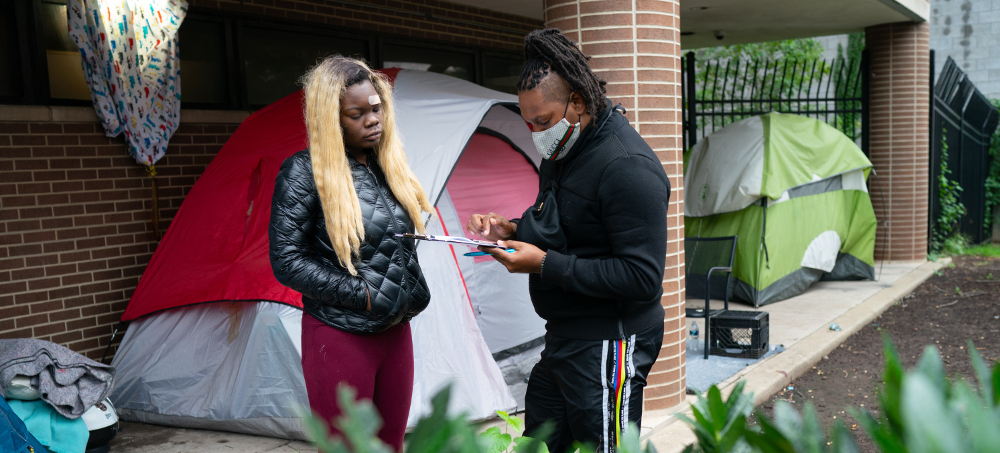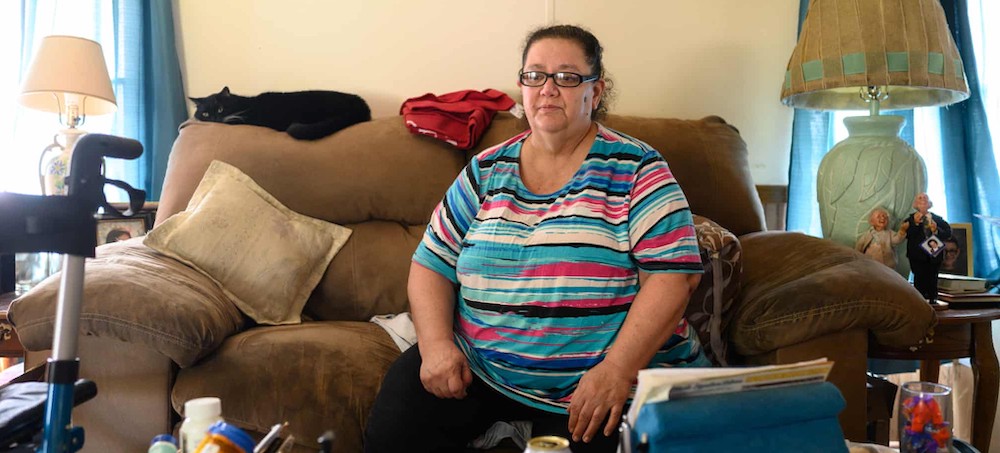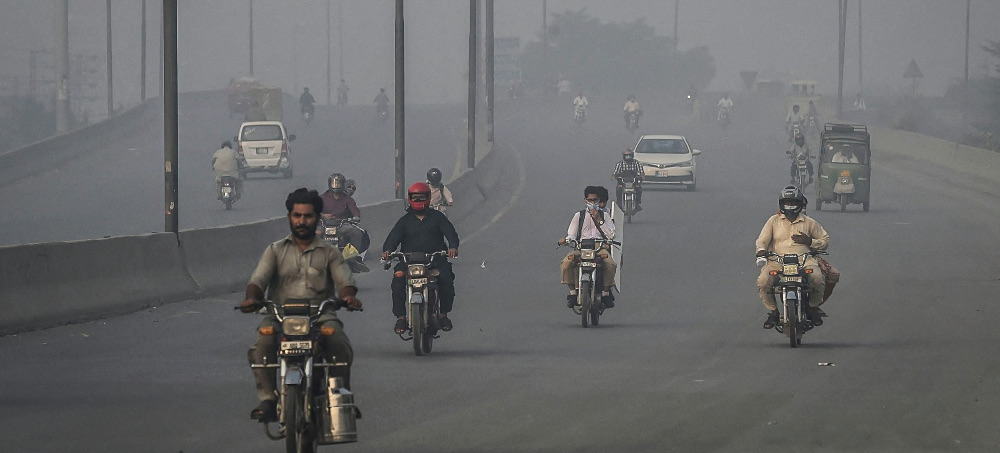
13 October 21
Live on the homepage now!
Reader Supported News
FOLKS. WE — REALLY — NEED SOME PROGRESS ON DONATIONS — We are looking at really poor fundraising returns. Some of you are going to be offended, but we have to improve on this situation. We need you to help. The time is now to get it done. With urgency.
Marc Ash • Founder, Reader Supported News
Sure, I'll make a donation!

Andy Borowitz | Trump to Skip 2024 Campaign and Go Straight to Claiming He Won
Andy Borowitz, The New Yorker
Borowitz writes: "Donald J. Trump will skip the 2024 campaign and go straight to claiming that he won, the former reality-show host has confirmed."
READ MORE
 A woman fills out a 2020 Census form with an outreach worker on Sept. 26, 2020. (photo: Sarah L. Voisin/The Washington Post)
A woman fills out a 2020 Census form with an outreach worker on Sept. 26, 2020. (photo: Sarah L. Voisin/The Washington Post)
2020 Census May Have Significantly Undercounted Black Americans, Analyses Say
Tara Bahrampour, The Washington Post
Bahrampour writes: "Two new analyses suggest the 2020 Census may have undercounted Black people at a significantly higher rate than usual, raising concerns about whether minority communities could lose out on fair representation and funding over the next 10 years."
Two new analyses suggest the 2020 Census may have undercounted Black people at a significantly higher rate than usual, raising concerns about whether minority communities could lose out on fair representation and funding over the next 10 years.
The Census Bureau has not yet released data that would allow comparisons of 2020 Census results with earlier estimates to assess the survey’s accuracy. But a simulation comparing the bureau’s estimates for 2020 with results from 2010 indicates that the country’s Black population may have been undercounted at a rate up to three as high as in 2010. And a second report suggests the undercount of Black children could be up to 10 times as high as a decade ago.
If the analyses are borne out, the higher undercounts could have profound implications for a wide array of federally funded services, including Medicaid and Medicare, the Supplemental Nutrition Assistance Program (SNAP), highway planning and construction, Section 8 housing vouchers and Head Start.
“This might be our greatest undercount since 1960, or 1950,” said Marc Morial, president and chief executive of the National Urban League, which sued the bureau last year to stop the count from ending early.
Even in the best of times, the census tends to overcount some populations and undercount others, with the highest undercounts among minorities, renters, low-income people and children. But the 2020 Census was fraught with challenges, including Trump administration efforts to add a citizenship question, the coronavirus pandemic, natural disasters, and legal battles over the count’s end date. All of these raised concerns among experts about whether the undercounts would be more significant this time.
“It was a perfect storm for an undercount on multiple levels,” said Rep. Brenda Lawrence (D-Mich.). Many people in poor and minority communities are already reluctant to respond to questions about their household members, a problem that was exacerbated by the additional challenges, she said. “I’m hopeful that the official numbers are not as low as the ones that the analysts are putting out, but the numbers that we’ve seen from these analysts are disturbing.”
The simulation, conducted by Connie Citro, a senior scholar at the Committee on National Statistics at the National Academies of Sciences, Engineering, and Medicine, presents three possibilities for a net undercount of people who check Black and no other race, based on the bureau’s low, middle and high independent population estimates released in December. Citro calculated an undercount of between 3.24 and 7.25 percent, compared with a 2.3 percent net undercount for that group in 2010.
For people who check Black in combination with other races, Citro’s analysis found a range between a 0.28 percent overcount and a 4.36 percent undercount, compared with a 1.1 percent undercount for that group in 2010.
The full extent of the survey’s undercounts and overcounts will become clearer next year when the bureau releases what is known as its modified race file, a tally that reassigns people who marked “some other race” alone into Black and non-Black categories. A post-enumeration survey, conducted by the bureau after each decennial census, will further assess the accuracy of the 2020 count.
In the meantime, Citro looked at how the bureau reallocated people who filled out “some other race” alone in 2010, then applied those ratios to the 2020 Census’s race and ethnicity data, which came out in August — adjusting for the fact that the number of people who marked that category increased in 2020.
While her analysis is only a simulation and is not peer-reviewed, Citro said, “it gives a clue that is backed up with other clues.”
Given the challenges in 2020, she added, “it would be surprising if this census did not have more errors than 2010 and 2000. They did an outstanding job with the hand they were dealt, but it was not a good hand to be dealt.”
The bureau said it is too early to draw conclusions about the survey’s accuracy. “The data to do that are just not available,” said Eric Jensen, the bureau’s senior technical expert for demographic analysis. “Any attempt to do that at this time would just be an approximation.”
Noting that more respondents marked “some other race” in the 2020 Census than in 2010 , Jensen said, “That’s why we want to be really careful and make sure that we are using 2020 data for doing that process.”
An independent report released last month by the American Statistical Association said its experts did not have enough information to determine the quality of the 2020 Census
A new system of fuzzing out some data to protect the privacy of respondents could further complicate attempts to assess the survey’s accuracy at smaller geographic levels.
The bureau’s demographic analysis estimates and modified race files contain only Black vs. non-Black categories because the estimates rely on some information, such as birth records, that goes back only far enough to identify younger Hispanics at this point. (The United States did not begin asking about Hispanic ethnicity until the 1980 Census.)
But an analysis published last week that includes Citro’s findings and focused on children suggested a high undercount for both Black and Hispanic children.
That report, by William O’Hare, author of the book “The Undercount of Young Children in the U.S. Decennial Census,” calculated that the undercount may have increased from 0.6 percent in 2010 to 5.8 percent for Black-alone children and from 2.1 to 4 percent for Hispanic children. The calculation showed an increase from 1.5 to 4.2 percent over the past decade for children who were Black-alone or in combination.
The report was posted on the website of the Count All Kids Committee, a coalition of organizations originally formed to see that all children were counted in the 2020 Census.
“I’m very concerned,” O’Hare said. “The biggest implication has to do with funding — federal funding and state funding. Places that have large numbers and percentages of Blacks and Hispanics the census data [misses], they won’t get their fair share of funding and resources.”
The 2020 Census was the first in which respondents were encouraged to fill out the form online, which made responding easier for some groups and possibly helped boost the self-response rate. “The self-response rate in 2020 was almost the same as 2010, but I have to wonder whether that might have worked well for middle-class and upper-class White families but not so well for Blacks and Hispanics,” O’Hare said.
Citro concurred, saying, “The self-response rate dropped dramatically in census tracts that were overwhelmingly minority, and when the self-response rates drop, the data gets flakier and flakier. So that’s why this seems to me somewhat plausible, what I am simulating.” She said that she had shared the analysis with the Census Bureau and that “they said the method that I’m using makes sense, given the data that are available.”
Some jurisdictions began voicing concerns about the 2020 Census after its results showed smaller populations than expected.
When race and ethnicity data was released in August, Detroit Mayor Mike Duggan said the census had undercounted his city by at least 10 percent, based on the number of residential households with current electricity accounts, and threatened legal action. A Duggan spokesperson said this week that the mayor is awaiting the results of a University of Michigan study before deciding whether to sue.
D.C. also expected a higher population count than the census found, and immigrant-heavy states such as Texas and Florida did not grow as much as anticipated, leading some census experts to suspect undercounts in these places.
One of those experts is Arturo Vargas, chief executive of NALEO Educational Fund, who professed skepticism in April after state population totals reflected lower-than-expected counts in states with large Latino populations. “As I said before, I smell smoke, and there is definitely fire when it comes to an undercount in 2020,” he said last week.
“This is not a blame game about the bureau’s competency,” Vargas said. “There were just such extraordinary circumstances, both internal, with the Trump administration mischief, and external, meaning pandemic, that despite the bureau’s yeoman’s effort, we’re just not going to have a better census in 2020 than in 2010.”
An undercount of poor and minority groups exacerbates inequality, Rep. Lawrence said, adding that when more-affluent communities are accurately counted, “then there’s resentment in the [poorer] community that ‘Why are they getting more money to repair their roads when ours are the ones in horrible condition? Why are they getting more senior and HUD programming?’ That’s why the census is so important.”
The Congressional Black Caucus, of which she is a leader, has formed a committee to look into preventing problems such as a fight over the survey’s end date, which was the subject of heated legal battles in October 2020 as the Trump administration pushed to end the count earlier than the bureau had planned. “We’re going to have to legislate so that cannot be an option, to stop the count early,” Lawrence said.
Although congressional apportionment cannot be adjusted to compensate for an undercount, and it would be hard to change redistricting after the fact, it might be possible to revise the way funds are allocated. Lawmakers could adjust formulas to take into account disparities that come to light when the numbers are released, said Terri Ann Lowenthal, a former staff director of the House census oversight subcommittee and a consultant on census issues. “Congress hasn’t really considered that in the past, but should it? Maybe.”
Vargas agreed, saying that if the post-enumeration survey shows a higher undercount than expected, “there’s no reason why the Census Bureau shouldn’t proceed with trying to come up with corrected numbers.”
READ MORE
 Rioters clash with police as they push barricades to storm the U.S. Capitol on Jan. 6, 2021. (photo: Robert Schmidt/Getty)
Rioters clash with police as they push barricades to storm the U.S. Capitol on Jan. 6, 2021. (photo: Robert Schmidt/Getty)
Capitol Rioter Admits to Two New Felonies While Representing Himself in Bond Hearing
Jordan Fischer, Eric Flack and Stephanie Wilson, WUSA
Excerpt: "Brandon Fellows sought to have his bond status revoked, only to make the legal case against him stronger."
Brandon Fellows sought to have his bond status revoked, only to make the legal case against him stronger.
Before his bond hearing began Tuesday, a federal judge warned Brandon Fellows he could be opening himself up to perjury – or even obstruction of justice – charges if he testified on his own behalf, and that he would likely be going back to jail, regardless. Two hours later, the judge’s warning turned out to be prescient.
“Most people do not do this,” U.S. District Judge Trevor McFadden told Fellows. “Obviously your attorney has discouraged this. I do not think this is a good idea… but I’m going to allow you to take the stand, if you wish.”
Fellows is an Albany, New York, resident under indictment on a felony charge of obstruction of an official proceeding in connection with the Jan. 6 Capitol riot. In charging documents, prosecutors say Fellows entered the Capitol through a broken window and wound up smoking marijuana in Sen. Jeff Merkley’s (D-OR) office.
Fellows was initially granted pretrial release, but was ordered back into custody in June after repeated violations, including missing a court-ordered mental health evaluation and allegedly calling a probation officer’s mother. The Justice Department also said when a clerk of the court attempted to contact Fellows about another violation – allegations that he was harassing a former girlfriend – it was discovered he had apparently put the number for the judge’s wife’s office instead of his own.
Last month, Fellows asked McFadden to allow him to represent himself pro se in his case – saying he had spent the previous two weeks in the D.C. Jail’s law library and determined that was what he wanted. Despite warning him, repeatedly, of the possible consequences of going it alone with no formal law training, McFadden ultimately granted Fellows’ request.
On Tuesday, Fellows appeared before the judge for his first full hearing as his own counsel to argue his bond status should be reconsidered. When McFadden denied his request to call his former public defender, Cara Halverson, as a witness, Fellows instead described a conversation he said he recorded with her about a “loophole” he’d found that could get McFadden removed from the case.
Fellows said he asked Halverson if he should contact McFadden’s family as a means of disqualifying him from presiding over his case. He also said he had told Halverson – to her horror – about a previous occasion in which he’d intentionally put the phone number of another judge’s wife as his emergency contact in order to get a new judge. In that case, the judge was replaced with another.
Fellows said Halverson told him that was illegal, and if that he tried to do that with McFadden he would wind up in jail on even more serious charges.
“When I’m worried, I don’t make the most understandable decisions,” Fellows told McFadden later in explanation.
Over the course of the nearly 2-hour hearing, Fellows rambled across a difficult-to-follow litany of complaints about his incarceration, stopping to touch on subjects as widely varied as the Taliban, Guantanamo Bay, a woman who’d left her child in a dumpster and a “constitutional lawyer” who had allegedly advised him to wrap his cell phone in tin foil to avoid capture.
In her much shorter cross-examination, Assistant U.S. Attorney Mona Furst got Fellows to admit – under oath – that he had climbed into the Capitol through a broken window without police permission, that he had used the previous judge’s wife’s contact information to try to get him removed from the case and that he had missed court-ordered mental health and drug testing appointments.
McFadden, having listened to him talk for nearly two hours, then brought Fellows back down to Earth.
“You are charged with a federal felony,” McFadden said. “This is not a community college where you get pats on the back.”
“You’ve admitted to incredible lapses of judgment here on the stand, not least of which was seeking to disqualify a New York state judge,” the judge continued. “You’ve admitted to obstruction of justice in that case, and you’ve admitted to what was probably obstruction in this case in trying to have me disqualified, and only Ms. Halverson’s advice stopped you from doing so. You’ve engaged in a pattern of behaviors that shows contempt for the criminal justice system, and I just have no confidence that you will follow my orders if I release you.”
McFadden then denied Fellows’ request to reopen his detention status and ordered him back into the custody of the D.C. Jail.
READ MORE
 Diana Morgan Magda, 58, at home in Girard, Ohio. (photo: Justin Merriman/Guardian UK)
Diana Morgan Magda, 58, at home in Girard, Ohio. (photo: Justin Merriman/Guardian UK)
'I Have Never Felt So Hopeless': Millions in US Fear Utility Shutoffs as Debts Rise
Michael Sainato, Guardian UK
Sainato writes: "Millions have fallen behind on utility bills since the pandemic started while utility debt is an estimated $32 billion."
Millions have fallen behind on utility bills since the pandemic started while utility debt is an estimated $32bn
The gas in Diana Morgan Magda’s house was shut off in May. Now when she wants to take a bath she uses an electric kettle to heat the water. It takes an hour.
Magda, who lives in Girard, Ohio, relies on social security disability benefits for her sole income. Like many Americans, she can’t pay all her bills, living expenses and medication with the benefits she receives, and through the pandemic she fell behind on utility bills.
Millions more Americans fell behind on utility bills during the pandemic. Utility debt increased from around $12bn before the pandemic to an estimated $32bn by the end of 2020, according to the National Energy Assistance Directors’ Association (NEADA).
The UK, Europe and China have been racked by soaring energy prices. So far most of the US has been spared the worst of it but economists are predicting that here too an energy crisis is looming, and as winter approaches prices are rising, potentially threatening the utilities of millions more.
“I’m disabled and have had to live without hot water, a stove to cook on, and now heat. It’s been so hard,” said Magda.
She’s behind on her electric bill and fears having that shut off as well. Attempts to get help with her utility bills have so far failed and she was told local charities and community groups are out of funds until 1 November.
“I can only eat certain things because I have to use the microwave or electric skillet,” added Magda. “Social security is not sufficient to cover my bills and everything else I need for a month. I was always sending what I could to the utility bills but couldn’t make the payments they asked for.”
Mark Wolfe, executive director of NEADA, noted utility debt could have been much worse without supplemental funding through the American Rescue Plan in March 2021 and additional funding to the annual budget of the Low Income Home Energy Assistance Program (LIHEAP).
Only Washington DC and three states – New York, New Jersey and Wyoming –have continued utility shutoff moratoriums that were begun during the pandemic. But worries of increases in utility debt remain. Unemployment benefits for millions of Americans expired in early September and natural gas prices are expected to rise by as much as 30% for consumers this winter throughout the US, Europe and Asia.
“The upcoming winter is of serious concern. Natural gas, heating oil and propane prices have become very expensive and will put pressure on families this winter,” said Wolfe. “If additional funding is not provided then I expect that arrearages will spike again, unless Congress provides additional funding for energy assistance programs.”
Most states do not require utility companies to provide data on debt collections and shutoffs. An analysis by the Center for Biological Diversity in June found over 1m households in 17 states in the US have experienced a utility shutoff since March 2020.
Since then, additional statewide shutoff moratoriums have expired, including in California where an estimated $2.7bn in utility debt was accrued during the pandemic.
More than one in four Americans report their households are struggling to cover usual expenses, while assistance funds have been slow to reach those in need.
On 7 September, utility workers arrived at Hunter Wade’s home near Marquette, Michigan, to shut off the utilities. A notice was sent to his house, shortly after his unemployment benefits expired. Wade had lost his income as a gig worker as a musician and working for a seminar company and says he never saw the shutoff notice.
“I wasn’t made aware of it until they were actually on my porch to disconnect the electric.
“It was pretty triggering. I cried in front of the utility workers,” said Wade. “I was a free-lunch kid, so it’s not my first time experiencing financial hardships. It was my first time getting shut off.”
He was able to get help from a local organization, but spent 24 hours without any electricity in the meantime, and is still concerned he might have the same problem with his utility company, owned and operated by his local town, until he is able to restore his income.
Some who spoke to the Guardian about their struggles facing utility shut-offs and paying debt and fees through the pandemic requested to remain anonymous.
A single mother in Indiana was laid off from her job earlier this year due to the pandemic. She recently landed a new job, but has struggled to cover expenses and bills because her unemployment payments ended in the beginning of September.
“I have never felt so hopeless or alone, because it seems like the world is just continuing on with no problems, and I’m struggling so much,” she said. “I’m just a giant bag of anxiety and crying, while trying to hide it from my kids.”
She found out hours before a utility shutoff notice expiration that her application for rent and utility assistance finally went through.
Others are still awaiting help, such as a mother of five young girls in Oklahoma, whose hours in her sales job are still reduced because of decreased demand. She was told her local organizations aren’t accepting any more applications for relief until they catch up on the influx they have already received, and her utility company refused to work with her on pausing payments until she’s able to make them.
“I gave birth to my daughter on September 8 and I had to return back to work a week later to be able to catch up on bills and be able to save up money to fix my car,” she said. “I’ve made payment arrangements on my utilities but I’ve failed to make a payment on them, so they cut my gas and I had to borrow money to be able to keep my electricity on for my kids.”
High utility bills and skyrocketing rates
High and unaffordable utility bills are a problem across the US that precedes the pandemic, but one that became more prominent in the past 18 months, as the lack of utility shutoff moratoriums have been linked to a rise in Covid cases and deaths.
“Utilities is one of those day to day issues that gets missed,” said Amna Farooqi, a senior organizer with the organization 9to5 Georgia. Farooqi noted elected officials have consistently diverted responsibilities when pushed on the issue of unaffordable utility bills, and high bills are blamed on personal use rather than systemic problems. “People are trying to kick the can of responsibility around, but we need federal policies in place, state policies in Georgia, but also local policies.”
In Albany, Georgia, where more than 30% live under the poverty rate, residents have experienced high utility bills for years, often exceeding $700 a month. A report released in September by 9to5 Georgia outlined why utility bills for the city and across the nation are often so high, citing the monopoly of energy companies, poor and energy inefficient housing, a lack of accountability for local and state governments overseeing utility services, and extreme weather events worsened by the climate crisis.
In the wake of hurricanes and winter storms throughout the US, utility companies have often passed on the costs incurred by these storms to residents, along with increased rates and fuel costs. Residents in Kansas, Louisiana, Texas and Arkansas have complained about sudden surges in their utility bills through 2021.
Jesse Dorle of Siloam Springs, Arkansas, noted her utility bills for a one-bedroom apartment have doubled, from around $175 to $350 a month in recent months due to costs incurred by utility companies for bad winter storms in early 2021.
“I have unplugged unnecessary devices, kept my air low or even off, to try and lower my bills. Also I stopped using my dishwasher, limited my washer and dryer use, trying to be more efficient. I even switched to energy-saving light bulbs. Still last month my bill was $365,” said Dorle. “Hard-working people like myself are struggling to keep our heads above water, and this hike is ruining us. Why should we have to pay enormously high costs for a basic human necessity?”
READ MORE
 Congress has authorized more funds to the Pentagon's fiscal year 2022 budget than President Joe Biden originally proposed. (photo: US-Indo-Pacific Command/Flickr)
Congress has authorized more funds to the Pentagon's fiscal year 2022 budget than President Joe Biden originally proposed. (photo: US-Indo-Pacific Command/Flickr)
"Fiscal Conservatives" Have No Problem With Astronomical Military Spending
Stephen Semler, Jacobin
Semler writes: "Conservatives in both parties are blocking the current infrastructure and reconciliation bills on account of the price tag. But the record shows they've never objected to sky-high defense budgets."
Conservatives in both parties are blocking the current infrastructure and reconciliation bills on account of the price tag. But the record shows they’ve never objected to sky-high defense budgets.
By the time the Senate passed Joe Biden’s infrastructure plan in August, Biden had negotiated away three-quarters of its original value to appease Republicans. This is especially worrying amid reports that Biden is now considering cutting down the larger, $3.5 trillion social spending bill to placate holdouts among conservative Democrats.
However, Biden’s military budget is doing just fine.
In stark contrast to the reconciliation and infrastructure bills, Congress authorized more funds to the Pentagon’s fiscal year 2022 budget than Biden originally asked for. Biden initially requested nearly $12 billion more than Trump’s last military budget for fiscal year 2022. The House and Senate armed services committees added almost $25 billion on top of that, bringing the top-line figure to $778 billion. While the Senate version has yet to come to a vote, the House passed a bill last month authorizing that amount by a 316-113 margin.
Roll call votes on military spending reveal that there are considerably fewer “deficit hawks” or “fiscal conservatives” in Congress than reported by mainstream media outlets, if any at all.
Last month, all House Republicans voted against an amendment offered by Representative Alexandria Ocasio-Cortez to reduce next year’s Pentagon budget by 10 percent. Similarly, even if Republicans had opposed instead of championed the 2017 tax cuts — projected to cost $6.7 trillion over the next decade — the GOP still voted for military spending increases under Trump 93 percent of the time.
And it’s not just Republicans — conservative Democrats are also hypocritical in their selective concern about the national debt.
For example, Representative Josh Gottheimer has decried the reconciliation bill’s cost — $3.5 trillion over ten years — and has gone so far as leading an effort in the House to vote on it and the infrastructure bill separately, all but ensuring the former never passes. But just two weeks ago, Gottheimer voted for the military policy bill that authorizes well over twice as much money per year as the reconciliation package.
In fact, Gottheimer voted for every Pentagon budget since he entered Congress. So, while he says it’s too expensive to obligate $3.5 trillion in social spending over ten years, Gottheimer has supported $3.91 trillion in military spending in only five years.
Gottheimer’s mix of obstructionism and hypocrisy isn’t unique to conservative Democrats in the House. In the Senate, both Kyrsten Sinema and Joe Manchin are ostensibly blocking the reconciliation bill over its cost. Yet Sinema and Manchin have voted yes on Pentagon budgets 100 percent of the time since entering office. The total cost of Sinema’s eight consecutive yes votes on military budgets is $5.96 trillion. For his part, Manchin approved $7.54 trillion for the Pentagon by voting for the last ten military budgets.
Calling out this hypocrisy is helpful in continuing to build and sustain public pressure on conservative Democrat holdouts to the reconciliation bill. Thankfully, Senator Bernie Sanders already has. So have Representatives Cori Bush, Pramila Jayapal, and Ocasio-Cortez.
Highlighting the hypocrisy of conservatives (in both parties) when it comes to government spending should become a staple of congressional progressive discourse.
There is nothing new about Washington shooting down social spending plans with austerity politics while always having enough money to sacrifice on force projection. Moreover, we will be in the same situation this time next year, as there are many progressive policies on tap that must be accompanied by an enormous amount of public pressure on Congress in order to have a shot at passing.
Ensuring the public knows that every member of Congress is fine with spending money — and objecting to a social program’s cost is typically a selective, conditional, and hypocritical practice — will be helpful in getting those much-needed policies passed.
READ MORE
 Maria Ressa, Rappler CEO and Nobel Peace Prize 2021 Laureate, gestures while talking at a restaurant in Taguig City, Philippines on Oct. 9, 2021. (photo: Aaron Favila/AP)
Maria Ressa, Rappler CEO and Nobel Peace Prize 2021 Laureate, gestures while talking at a restaurant in Taguig City, Philippines on Oct. 9, 2021. (photo: Aaron Favila/AP)
We Spoke to Journalist Maria Ressa After Her Nobel Peace Prize Win
JC Gotinga, VICE
Gotinga writes: "For newly-awarded Nobel Peace Prize laureate Maria Ressa, one of her darkest days happened to be the one on which George Clooney made her coffee."
"Being fearless doesn’t mean you don’t feel afraid. It just means you know how to handle your fear."
For newly-awarded Nobel Peace Prize laureate Maria Ressa, one of her darkest days happened to be the one on which George Clooney made her coffee.
It was in April 2019 in New York City, when the Filipino journalist of 35 years had just finished speaking in a panel alongside Al Jazeera’s Mohamed Fahmy and the Washington Post’s Jason Rezaian, who had both been incarcerated for their reporting in Egypt and Iran, respectively.
At the time, Ressa and the independent news company she co-founded in 2012, Rappler, were already neck-deep in court cases widely regarded by rights advocates as politically motivated. Rappler had been exposing human rights violations in the Philippines’ war on drugs, disinformation networks linked to the government under President Rodrigo Duterte and his allies, and corruption in big-ticket public projects.
Just months before that day in New York, the government had attempted to shut Rappler down by revoking its license to operate. Sitting between Fahmy and Rezaian on the panel, it dawned on Ressa: The attacks could get worse.
After the panel, Ressa found herself in an upstairs office with Clooney, the Hollywood actor and activist, and his wife, international human rights lawyer Amal Clooney, to discuss how they might help her and Rappler win the lawfare the Philippine government was waging against them.
Amal sat with Ressa to talk, and George went over to the espresso machine and made coffee for everyone.
“So Amal is here, giving me the entire world of what’s happened to journalists, and asking me questions I didn’t really understand at that point. And I kind of pride myself in being prepared for anything,” Ressa told VICE World News in an interview on October 11, three days after this year’s Nobel Peace Prize awardees were announced.
The scale of her own fight was global, and it could take turns she had not foreseen, Ressa realized. “George then sits down and says, ‘Tell me about your security.’”
Despite having been arrested twice—once upon touchdown at the Manila airport in 2019—Ressa kept returning to the Philippines after her international engagements. As a dual citizen of the Philippines and the U.S., she had the option not to do so.
For this and her unflinching defense of independent journalism, Ressa has become internationally recognised as the face of courage for journalists in the Philippines, where the government continues to tighten the noose on critical reporting and political dissent.
This status was cemented on October 8, when Ressa and Russian journalist Dimitry Muratov were awarded the Nobel Peace Prize “for their efforts to safeguard freedom of expression, which is a precondition for democracy and lasting peace," according to a statement from the organization.
Ressa said she was “shocked” and “stunned” as she welcomed the news.
“I think that is why the Nobel committee gave this year’s prize to journalists—because it has never been as hard to fulfill the mission of journalism, which, in the end, is holding power to account,” she said, adding that the prize is a recognition of all journalists around the world who continue their work amid pressure and danger.
Looking back on her meeting with Amal and George Clooney, Ressa said she had never questioned herself for putting up with the constant vitriol from online trolls and government pulpits until then, when the full weight of the danger she was facing sank in.
“What Amal was able to throw at me was I realized how little I knew about international law and, actually, worst-case scenarios,” she said.
After the meeting, Yeganeh Salehi, Rezaian’s wife who was also jailed in Iran for her reporting, approached Ressa. “We hugged each other, I guess because that was it—it could get worse.”
And get worse, it did. In June 2020, a Manila court found Ressa and her former colleague, Reynaldo Santos Jr, retroactively guilty of cyber libel over a 2012 news article published before the Philippines had enacted the law. Ressa and Santos are out on bail as their lawyers appeal the verdict, but an affirmation by the Supreme Court could see them both imprisoned.
Condemnation of the verdict as politically motivated poured in from the international community. Amal Clooney called the decision a “sinister action,” and she urged the high court to reverse it. “This conviction is an affront to the rule of law, a stark warning to the press, and a blow to democracy in the Philippines,” Clooney said at the time.
Ressa kept going and Rappler continued its critical reporting on the situation in the Philippines, although under much more strain and with less resources as the pile of court cases required legal fees to the tune of $1 million per year.
The online attacks continued, too. A study by the International Center for Journalists published by UNESCO last April compiled nearly half a million social media posts against Ressa and found that 60 percent of the attacks “were designed to undermine her professional credibility and public trust in her journalism.”
“The other 40 percent was meant to tear down my spirit,” Ressa said. “They were personal attacks. They were dehumanizing: taking [an image of] my head and pasting it, putting it on top of human genitals—taking what you would think is a weakness and exploiting it and pounding it open.”
Ressa’s crusade against online disinformation cuts to the heart of what threatens democracy and freedom of expression in the Philippines and beyond, as governments use it to erode trust in journalists. “Disinformation makes people doubt everything,” she said.
With social media platform algorithms feeding users content that sustains their attention—anger, hate, conspiracy theories—regardless of whether they’re true, governments are able to “insidiously manipulate” the conversation in their favor, and incite hate towards truth-tellers including journalists, she added.
Ever the intrepid journalist, Ressa sees being a target of manipulated online hate as “both a blessing and a curse,” as it puts her in a prime position to report about it.
“When you’re the target, you see firsthand as the tactics change, and if you are looking at it as research, which is what I intended to do, then you can see the patterns faster,” she said.
Knowing how the system behind the persecution works helps her cope with it, Ressa added, but she admitted the trolling still leaves a mark.
“Of course it affects you,” Ressa replied, explaining how she draws strength from being part of the four-woman Rappler management team.
“Being fearless doesn’t mean you don’t feel afraid. It just means you know how to handle your fear. And with four of us, only one can be afraid. The other three have to be really strong, and we rotate the fear,” she said. “The other part is the energy from our young reporters. The idealism of youth—you really need that.”
With a young team of roughly 120 employees, Rappler is one of the Philippines’ most prominent news organizations, alongside much larger broadcast networks and newspaper companies. Having previously headed the country’s largest broadcaster, ABS-CBN, Ressa helped establish the purely-online news outlet in 2012 as she foresaw technology—and public conversation—shifting to social media.
Despite what she calls the “toxic sludge” of disinformation currently plaguing social media, Ressa believes the conversation can still be steered back to facts if people—journalists or not—keep making the effort to “abolish lies.”
“I’m optimistic that journalists will pave the way that will allow facts to win the battle against lies, that will help create our shared reality, that will help create evidence-based reasoning, because that is what the world needs,” Ressa said.
“That’s how justice is created.”
READ MORE
 Commuters ride along a road under smog and fog conditions in Lahore, Pakistan on Oct. 6, 2021. (photo: Arif Ali/Getty)
Commuters ride along a road under smog and fog conditions in Lahore, Pakistan on Oct. 6, 2021. (photo: Arif Ali/Getty)
UN Declares Access to a Clean Environment a Human Right
Reuters
Excerpt: "The U.N. Human Rights Council on Friday recognized access to a clean and healthy environment as a fundamental right, formally adding its weight to the global fight against climate change and its devastating consequences."
The resolution, first discussed in the 1990s, is not legally binding but has the potential to shape global standards.
The U.N. Human Rights Council on Friday recognized access to a clean and healthy environment as a fundamental right, formally adding its weight to the global fight against climate change and its devastating consequences.
The vote passed with overwhelming support, despite criticism in the lead-up from some countries, notably the United States and Britain.
The resolution, first discussed in the 1990s, is not legally binding but has the potential to shape global standards. Lawyers involved in climate litigation say it could help them build arguments in cases involving the environment and human rights.
“This has life-changing potential in a world where the global environmental crisis causes more than nine million premature deaths every year,” said David Boyd, U.N. special rapporteur on human rights and the environment, who called the decision a “historic breakthrough”.
The text, proposed by Costa Rica, the Maldives, Morocco, Slovenia and Switzerland, was passed with 43 votes in favour and 4 abstentions from Russia, India, China and Japan, prompting a rare burst of applause in the Geneva forum.
Britain, which was among the critics of the proposal in recent intense negotiations, voted in favour in a surprise, last-minute move. Its ambassador to the UN in Geneva, Rita French, said the UK was voting ‘yes’ because it shared supporters’ ambition to tackle climate change but added that states would not be bound to the resolution’s terms.
The United States did not vote since it is not currently a member of the 47-member Council.
Costa Rica’s ambassador, Catalina Devandas Aguilar, said the decision will “send a powerful message to communities around the world struggling with climate hardship that they are not alone”.
Critics had raised various objections, saying the Council was not the appropriate forum and citing legal concerns.
Environmental defenders had said Britain’s earlier critical stance was undermining its pledges ahead of the global climate conference it is hosting in Glasgow next month.
John Knox, a former U.N. special rapporteur, said ahead of the vote that those who had criticised the resolution were “on the wrong side of history”.
The World Health Organization estimates that some 13.7 million deaths a year, or around 24.3% of the global total, are due to environmental risks such as air pollution and chemical exposure.
Another proposal led by the Marshall Islands to create a new special rapporteur on climate change was also approved by the Council on Friday.
READ MORE
Contribute to RSN
Follow us on facebook and twitter!
Update My Monthly Donation
PO Box 2043 / Citrus Heights, CA 95611










